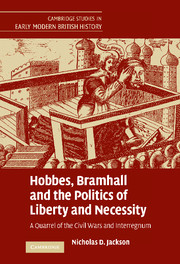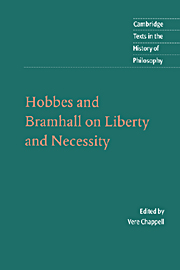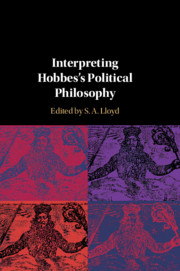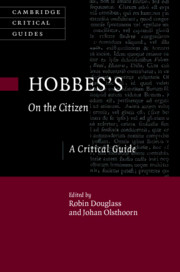Hobbes, Bramhall and the Politics of Liberty and Necessity
This book was the first full account of one of the most famous quarrels of the seventeenth century, that between the philosopher Thomas Hobbes (1588–1679) and the Anglican archbishop of Armagh, John Bramhall (1594–1663). This analytical narrative interprets that quarrel within its own immediate and complicated historical circumstances, the Civil Wars (1638–49) and Interregnum (1649–60). The personal clash of Hobbes and Bramhall is connected to the broader conflict, disorder, violence, dislocation and exile that characterised those periods. This monograph offered not only the first comprehensive narrative of their hostilities over two decades, but also an illuminating analysis of aspects of their private and public quarrel that have been neglected in previous accounts, with special attention devoted to their dispute over political and religious authority. This will be of interest to scholars of early modern British history, religious history and the history of ideas.
- Was the first comprehensive account of one of the most famous quarrels of the seventeenth century, that between the philosopher Thomas Hobbes and the Anglican archbishop of Armagh, John Bramhall
- Offers an illuminating analysis of aspects of their private and public quarrel that have been neglected in previous biographical, historical and philosophical accounts
- This will be essential reading for scholars of early modern British history, religious history and the history of ideas
Reviews & endorsements
"[The book's] writing is clear and engaging, and the level of scholarship is high...Jackson's book is a significant contribution to the literature and will be of value to anyone interested in Hobbes, the political and religious struggles of the English Civil Wars, or in the seventeenth-century intellectual history."
American Historical Review, Douglas M. Jesseph, North Carolina State University
"Nicholas Jackson’s account of the debate over free will between Hobbes and Bramhall, originating in the 1640s before spilling into print in the 1650s, is yet another welcome contribution to the study of Hobbes, while also bringing the bishop out from the philosopher’s shadow and releasing their encounter from the confines of philosophy and theology. Cambridge University Press continues to confirm the value of adding the consideration of context to the consideration of texts, in its Early Modern British History series as much as those series overseen by Quentin Skinner." -Geoff Kemp, The European Legacy
Product details
November 2007Hardback
9780521870061
356 pages
229 × 152 × 24 mm
0.69kg
Available
Table of Contents
- Introduction
- 1. Bishop Bramhall, the 'Great Arminian', 'Irish Canterbury' and 'Most Unsound Man in Ireland', 1633–41
- 2. Bishop Bramhall, the Earl of Newcastle, Thomas Hobbes and the first English Civil War
- 3. Hobbes's flight to France, De Cive and the beginning of the quarrel with Bramhall, summer 1645
- 4. An epistolary skirmish, 1645–6: Bramhall, 'Discourse', Hobbes, 'Treatise' and Bramhall, 'Vindication'
- 5. Bramhall and the Royalist schemes of 1646–50
- 6. Hobbes and Leviathan among the exiles, 1646–51
- 7. The public quarrel: Hobbes, Of Liberty and Necessity, 1654, Bramhall, Defence of True Liberty, 1655 and Hobbes, Questions concerning Necessity, Liberty and Chance, 1656
- 8. Castigations of Hobbes's Animadversions and The Catching of Leviathan, 1657–8: Hobbes as Leviathan of Leviathans
- 9. The restoration and death of Bramhall and Hobbes's last word, 1668
- Conclusion.







